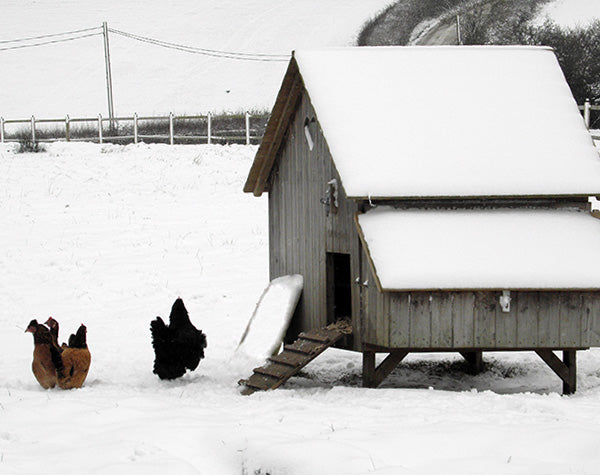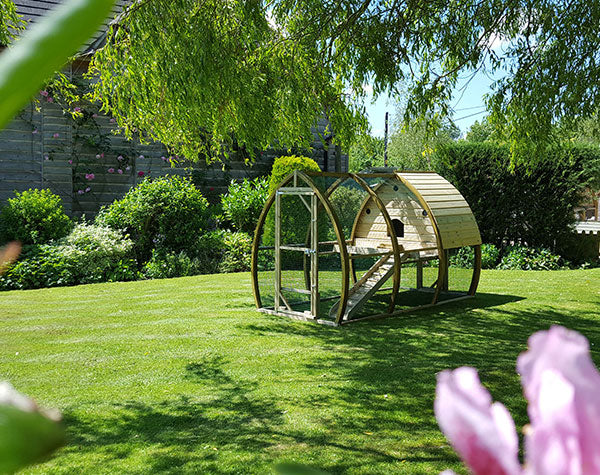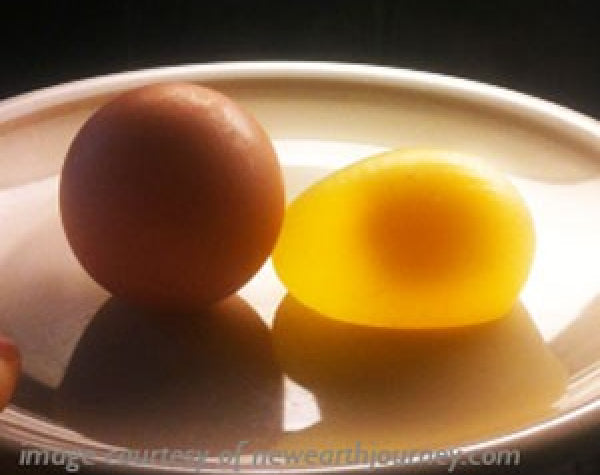What should I do for my Chickens during Winter?

Perpetual dusk, lashing rain, soggy snowdrifts and a biting wind straight from the steppes of Siberia don't exactly combine to offer the most enticing prospect for lingering in the garden any longer than we absolutely must.
It's precisely because of such conditions, however, that we need to offer our feathered friends extra care to see them through the cold, dark winter months and ensure they emerge phoenix-like in the spring, fired-up and ready to lay for England.
Here are some of our helpful hints for happy hens during the coldest season.
Muddy Warfare
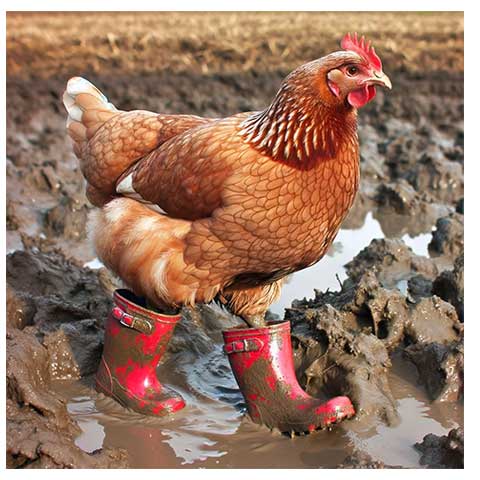
Mud; glorious for a Hippo, but for Chickens, it's a no-no. Your little descendants of Jungle Fowl might be happy scratching amongst luscious leaf litter, but allow their area to turn into a Glastonbury mudbath and they'll be reporting in sick faster than you can say 'galoshes'.
In a devilish double-pronged attack, mud not only can contain a dangerous build-up of parasites and bacteria harmful to your little poultry pals, but the constant damp and cold can also lead to a kind of 'foot-rot', as well as the lethal Coccidiosis, which you really want to avoid. A Ground Sanitising Powder or purpose-made Poultry Disinfectant will help.
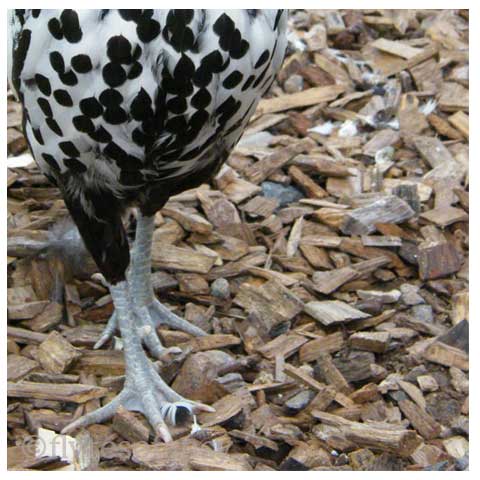
Whilst a concrete base for a Run can make it easy to keep clean, concrete itself can be a terribly cold, hard and unforgiving surface, so we find the best solution is Hardwood Woodchip (not Bark) and plenty of it.
Hardwood Woodchip is the perfect winter floor covering. It allows mud, rain and mess to drain through it and will leave your Chicken Run or Pen clean and dry. Sprinkle with Ground Sanitising Powder or Disinfect monthly. We have used it for many years ourselves with great success.
This Old House
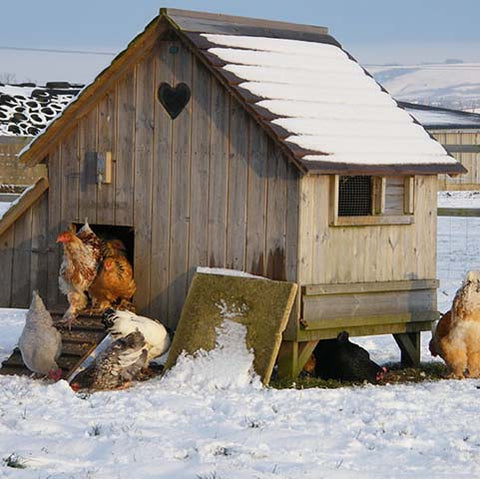
Your girls will spend more time housebound in the coming winter months than at any other time of the year, so it's well worth ensuring that your Poultry Housing is fit for purpose before winter sets in.
Firstly, check that everything is in good repair and that neither the rain nor wind can penetrate.
Chickens really don't like the wet weather and mud (the lack of webbed feet is a real giveaway!), so if your house is damp, now is the time to think about repair or replacement.
Draughts are another bugbear, particularly at this time of year. Whilst adequate ventilation is essential for health, a direct draught will soon turn your household of happy hens into very poorly poultry indeed.
If you would like further advice on Chicken Houses, please visit our page on Choosing the best Chicken House.
Beddy Byes
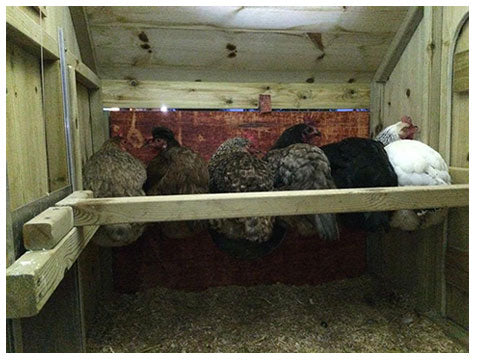
When it comes to providing a cosy winter retreat, preparation is everything. Autumn is the time to thoroughly clean the hen house with a purpose-made sanitiser like Smite Sanitiser Liquid. These cleaners remove organic matter and any dormant red mite, as well as bacteria.
In the summer months, only an inch of bedding is needed on the coop floor, and a few inches in the nest boxes, because the birds do not spend long hours in the coop. But in winter, when they roost for 12 hours or more, we should consider adding more bedding to provide natural insulation against the cold.
A deep layer of Chopped Hemp Bedding for your huddled masses is very important in foul weather. So it's worth spending some time to choose wisely.
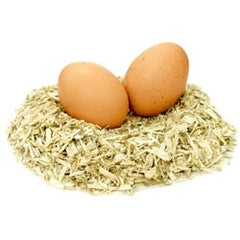
We recommend the dust-free HempBed-E Poultry Bedding, particularly because of its high absorbency, good insulation properties and Eucalyptus additives, which will collectively offer your girls the best chance of a warm, comfortable and disease-free winter.
Aubiose Chopped Hemp Bedding is also super absorbent and a good insulator. Whichever you choose, in winter, do ensure that you put down a thick layer on the henhouse floor and in the nest boxes. Regularly remove any mess to discourage rats and the build-up of bacteria.
There are several types of bedding we offer on our website. Easichick is a dust-free, bacteria-free, recycled wood fibre. Dengie Fresh Bed, a dust-extracted chopped straw with added pine oil, a natural anti-bacterial mite repellent. Or Easibed, which is a good choice for deep litter. Wood Shavings (dust extracted only) are also commonly used, as we did for many years, until we found it was simply not as absorbent as Hemp.
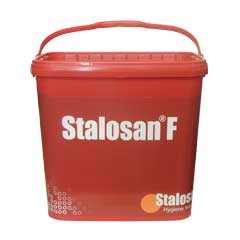
For peace of mind, you could also sprinkle a powder disinfectant such as Stalosan F Powder on the floor. These powders will absorb much of the moisture and kill any opportunistic bacteria.
A quick note here about Hay and Straw. Whilst seen by some as 'traditional' bedding, do remember that 'traditionally' we also used to empty our chamber pots into the street - with much the same results!
Straw and Hay rot when wet and have very low absorbency. It smells. It leaves your ladies at the mercy of the damp and their own poo, which, incidentally, provides perfect conditions for potentially deadly mould spores to develop. Like the Plague, some things are better consigned to the history books!
Crazy Like a Fox
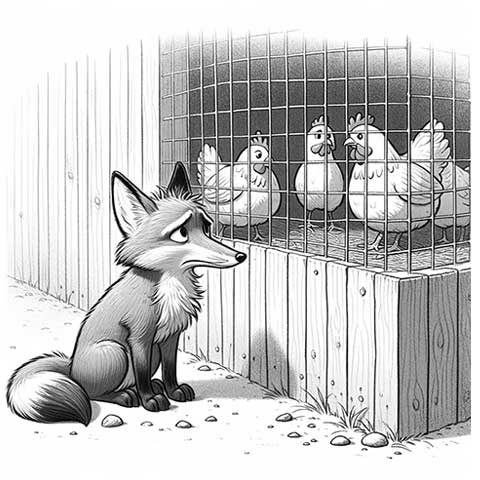
All predators are at their hungriest in the winter months and will go to extreme lengths to tuck into a tasty chicken dinner.
Foxes and Badgers will regard traditional chicken wire merely as a trifling inconvenience and more of an opportunity to work up an appetite than anything else.
All our Coops and Runs are protected with strong galvanised Weldmesh for a good reason, so if you are relying on the old-fashioned chicken wire, then the sooner it's changed, the better.
Rats, Stoats and Mink are also killers and can squeeze into the smallest of spaces in search of a sneaky snack, so check that your timber is free from rot and areas of weakness.
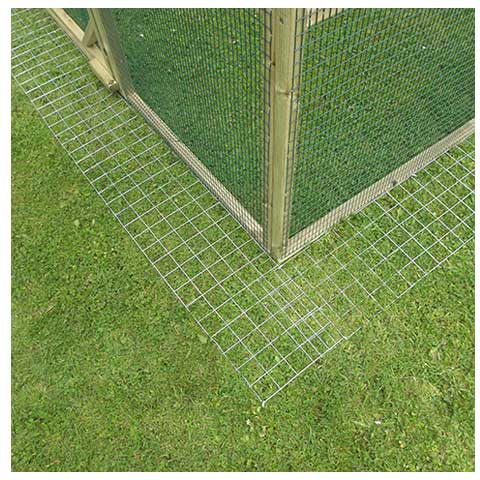
Finally, remember that Foxes, Badgers, and Rats are all accomplished diggers, miniature JCBs if you will, so if you want to prevent them from making a 'great escape' with your flock, then regularly check the ground for disturbed earth and for any gaps between the Run base and the ground.
An Anti-Fox No-Dig Mesh Skirt gives added protection and will frustrate the most determined of predators.
Just the Tonic
Prevention, as they say, is always better than cure, and the phrase could be no more apt when describing worm and internal parasite control.
Worms in chickens are the plague of most poultry keepers and are very common. For detailed information about worms and how to treat them, please see our page on Poultry Worms - Treat and Prevent.
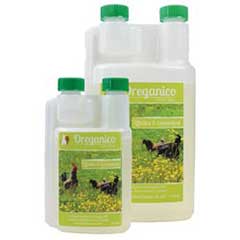
Just like all of us, Chickens are particularly susceptible to periods of illness during the chilly winter months, so if you want to boost their immune systems, then do consider adding some Oreganico Poultry Tonic to their water. This is an Oregano-based herbal tonic, much beloved by poultry keepers. We find it is perfect to keep the girls in tip-top condition and boost their immune systems during the winter.
Do also remember that the annual moult is a particularly stressful (and cold!) process, and peculiarly often occurs in the colder months. To help our girls get back to full health during this winter wardrobe change, we would recommend a tonic like Oreganico or high-protein feeds to supplement the lack of worms and insects. High-protein feeds or treats will provide the extra protein they need to grow back feathers quickly (feathers are pure protein).
Speaking of feathers, don't forget that at this time of year, many less-welcome and less-visible creatures will also be looking for a cosy home and a regular blood meal. Help is at hand, however, to combat these aspiring (red mite) vampires in the form of Diatomaceous Earth Powder to liberally sprinkle around the Henhouse and Louse Powder for your girls' feathers and also for their bedding.
When the wind blows
I don't like to see our girls huddled together against the whistling wind and lashing rain when they go outside to stretch their legs and indulge in a little light foraging.
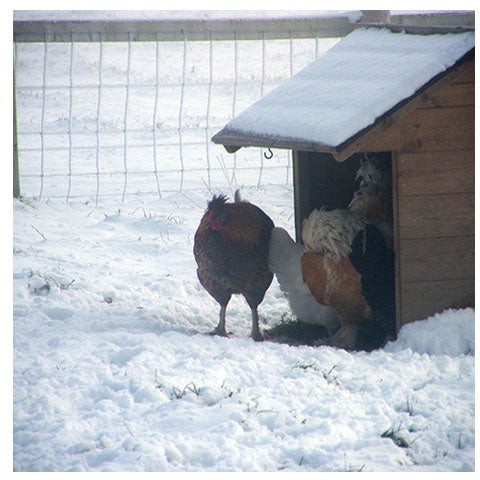
Constant bad weather has an adverse effect on any Chicken's health, so here are a few tips to mitigate the worst of its effects.
Firstly, ensure that the pop-hole to your Chicken Coop is facing away from the wind.
Do remember though, that although our prevailing winds are south-westerly (in the UK), if they veer to the east or northeast, they may be especially cold and you may have to turn the henhouse again.
A windbreak is also a good idea, especially if your girls are confined to a Run and cannot seek the protection of a nearby hedge - even a basic fence panel will do the job.
You could also think about fashioning a shelter in the garden. It doesn't have to be grand (or pretty), but it must be solidly built - the last thing you want, of course, is for it to blow over and prematurely spatchcock your flock!
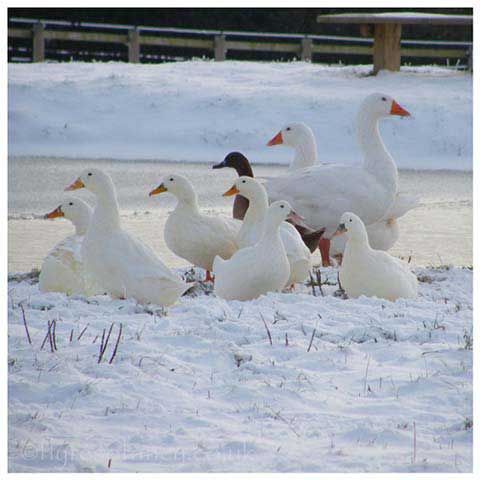
Ducks and Geese, being waterfowl, are a little more hardy and look after themselves quite well. However, although they would shelter under a hedge, as they would in the wild, it would be good to provide shelter or housing for them.
And, don't forget to make sure their pond has ice-free areas, as well as making sure they have unfrozen drinking water. You should also supplement their natural feeds (Geese eat primarily grass, so if it is covered in snow, they cannot do this), by providing a mixed corn feed.
With that in mind, we offer our own purpose-built Chicken Field Shelters, which are specifically designed with chooks and ducks in mind!
Shackleton's Bits
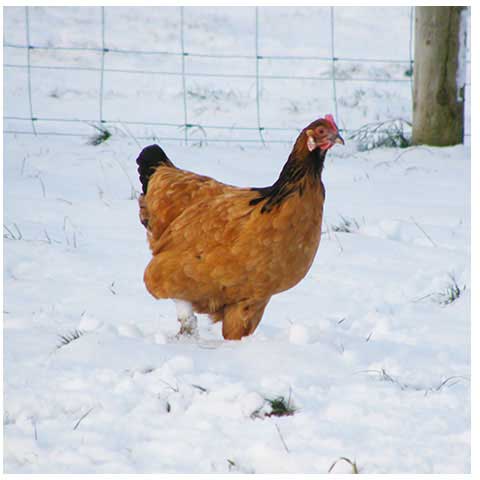
Equipped for a tropical climate, your descendants of 'Gallus Gallus' can require extra protection during freezing weather.
Frostbite can be a real problem for exposed wattles and ear lobes with unsightly blackened areas being the least serious result.
Prevention is easy though, and just requires the application of some Battles Comb & Wattle Protector, or simple Vaseline, to the fleshy parts. This forms a protective barrier against the elements, and the process of rubbing it in also helps stimulate blood flow back to their chilly bits!
Hothouse Flowers
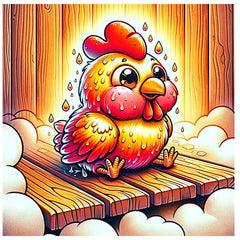
Normal poultry housing does not require heating, provided there are enough feathered inhabitants inside to create their own 'central heating' system.
All our chicken houses have a recommendation for optimal occupancy, but even if your girls aren't lucky enough to live in a Flyte so Fancy henhouse, please give us a call, and we will do our best to advise.
Please, please, do not be tempted to put heaters of any kind in your Henhouse, as you may kill your girls with kindness - overheating them whilst they are locked inside (remember dogs in hot cars?) or even inadvertently turning the house into a flaming barbecue.
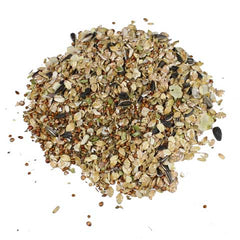
When it is really cold, however, you can help your ladies by making sure they have a thick insulating layer of good dry bedding (see 'Beddy Byes' above) and some tasty Smallholder Super Mixed Corn before going to bed.
The carbohydrate energy from the mixed corn will warm their cockles and help them to produce their own heat at night.
When it's really cold, I'm sure we all get the urge for a nice warm breakfast - a bowl of porridge springs to mind, very comforting - we can now offer Porridge for Chickens too. A great carbohydrate booster on cold days.
Essential Checks
As we all know, a human can survive for weeks without a proper meal, but mere days without water.
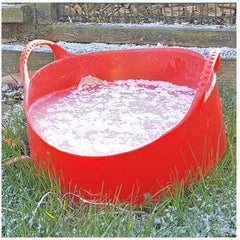
Your chooks' water supply should be checked at least once a day (ideally twice) to ensure that it is adequate, hasn't been knocked over, and hasn't frozen.
If freezing temperatures are forecast, then we suggest bringing the drinker indoors overnight or having a secondary drinker to take out each morning.
Alternatively, if you have mains power nearby, there are also electric heater plates (shown below) made for poultry drinkers. Very low wattage, low-level heat, just to prevent water freezing (not meant for extreme temperatures).
Their Feed can also freeze in extreme conditions, but never be tempted to put either feed or water into the house itself. Not only do Chickens lose interest in eating at bedtime, but the water will increase the humidity inside the house, and any spills will make the bedding and litter wet.
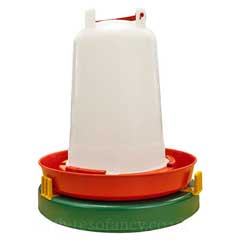
With wet bedding/litter being one of the prime causes of coccidia infections, and spilt feed attracting Rats from miles around, I really can't emphasise this enough.
There are, of course, exceptions to every rule (such as when you are confining birds and have no choice), but in all other cases ... don't do it ... please ...
Winter Blues
For a tantalising treat over winter, you can give your girls a boost with some Garvo Alfamix for Chickens, which they will absolutely love, but be careful not to give them too much!
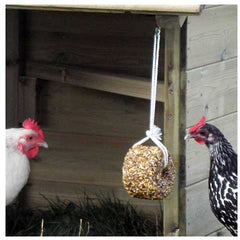
With feathers being predominantly composed of protein, these protein-rich foods are particularly good to give after the moult when their bodies are trying to grow new feathers.
Long hours of season-imposed close confinement can lead to bullying and feather-pecking, habits which, once established, are difficult to break.
To relieve the winter boredom, try hanging up a Boredom Buster Pecking Ring. It will keep the troops entertained for days on end.
AH ... choo!
Dark days spent in the Coop in close proximity to one another means that any outbreak of winter colds can spread very quickly. Any coughs and sneezes, therefore, should be dealt with as promptly as possible.
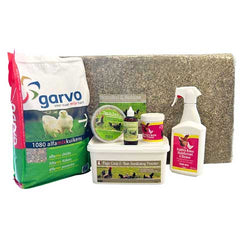
An all-round, almost-as-good-as-antibiotics product is Oreganico Poultry Tonic, which we use on our girls and is a really brilliant natural medicine to keep the birds wheeze-free.
All the products highlighted above are available from this website in our Health & Hygiene Section, and a selection of which are included in our very own Winter Care Pack for Chickens.
We are always interested to hear of any new products that customers have found and think other chicken keepers would be interested in - do let us know.
For more advice and help ...
I hope this information helps when considering your poultry health and housing for the winter months. If you have any further queries, please Email Us.
- - - -
Winter Care for Chickens is ©Flyte so Fancy 2012. Updated 2022. Author: Anne Weymouth (Co-Founder and Co-Director, Flyte so Fancy). Reproduction of part or all of this text is only possible with the express permission of Flyte so Fancy Ltd.

